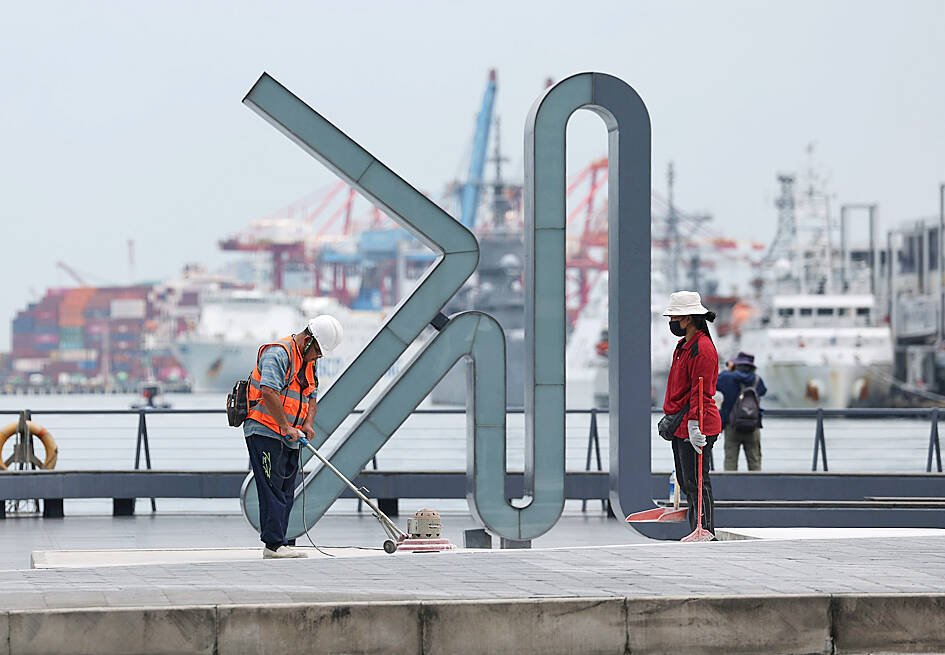The job market last month showed mild improvement by measure of the unemployment rate, but an ongoing economic slowdown weighed on the manufacturing industry’s hiring activity, the Directorate-General of Budget, Accounting and Statistics (DGBAS) said yesterday.
The unemployment rate shed 0.06 percentage points to 3.56 percent, the lowest in 23 years for the same period, after fewer people lost their jobs to business downsizing or closures, the statistics agency said.
This month’s results were relatively flat, as the job market has emerged from the COVID-19 pandemic, DGBAS Census Department Deputy Director Chen Hui-hsin (陳惠欣) said.

Photo: CNA
However, the unemployment rate could increase from next month, as graduating students would boost the number of first-time jobseekers, Chen said.
The number of unemployed people decreased 1.64 percent, or by 7,000, to 417,000, from a month earlier, the agency said.
The figures came after people who lost jobs to business downsizing and closures decreased by 4,000, and the number of first-time jobseekers fell by 2,000, it said.
By contrast, the number of people who work fewer than 35 hours per week due to economic reasons increased by 5,000 to 200,000, it said.
An increase of 5,000 is within a reasonable range and is not alarming, Chen said.
The unemployment period averaged 21.1 weeks, a decline of 1.5 weeks from a month earlier, and decreased of 0.7 weeks to 24.4 weeks among first-time jobseekers, the agency said.
People with university degrees had the highest unemployment rate at 4.84 percent, followed by those with high-school diplomas at 3.23 percent and people with graduate degrees at 2.82 percent, it said.
The unemployment rate for people with junior-college diplomas was 2.55 percent, and 2.42 percent for those with junior-high school education or below, it said.
People aged 20 to 24 had the highest unemployment rate of 11.75 percent, followed by the 15 to 19 age group at 8.26 percent, the 25 to 29 age bracket at 6.07 percent and the 30 to 34 age group at 3.72 percent, it said.
People aged 45 to 64 had the lowest unemployment rate of 2.18 percent, as protracted labor shortages led businesses to hire more older people, it said.

Hon Hai Precision Industry Co (鴻海精密) yesterday said that its research institute has launched its first advanced artificial intelligence (AI) large language model (LLM) using traditional Chinese, with technology assistance from Nvidia Corp. Hon Hai, also known as Foxconn Technology Group (富士康科技集團), said the LLM, FoxBrain, is expected to improve its data analysis capabilities for smart manufacturing, and electric vehicle and smart city development. An LLM is a type of AI trained on vast amounts of text data and uses deep learning techniques, particularly neural networks, to process and generate language. They are essential for building and improving AI-powered servers. Nvidia provided assistance

DOMESTIC SUPPLY: The probe comes as Donald Trump has called for the repeal of the US$52.7 billion CHIPS and Science Act, which the US Congress passed in 2022 The Office of the US Trade Representative is to hold a hearing tomorrow into older Chinese-made “legacy” semiconductors that could heap more US tariffs on chips from China that power everyday goods from cars to washing machines to telecoms equipment. The probe, which began during former US president Joe Biden’s tenure in December last year, aims to protect US and other semiconductor producers from China’s massive state-driven buildup of domestic chip supply. A 50 percent US tariff on Chinese semiconductors began on Jan. 1. Legacy chips use older manufacturing processes introduced more than a decade ago and are often far simpler than

STILL HOPEFUL: Delayed payment of NT$5.35 billion from an Indian server client sent its earnings plunging last year, but the firm expects a gradual pickup ahead Asustek Computer Inc (華碩), the world’s No. 5 PC vendor, yesterday reported an 87 percent slump in net profit for last year, dragged by a massive overdue payment from an Indian cloud service provider. The Indian customer has delayed payment totaling NT$5.35 billion (US$162.7 million), Asustek chief financial officer Nick Wu (吳長榮) told an online earnings conference. Asustek shipped servers to India between April and June last year. The customer told Asustek that it is launching multiple fundraising projects and expected to repay the debt in the short term, Wu said. The Indian customer accounted for less than 10 percent to Asustek’s

Gasoline and diesel prices this week are to decrease NT$0.5 and NT$1 per liter respectively as international crude prices continued to fall last week, CPC Corp, Taiwan (CPC, 台灣中油) and Formosa Petrochemical Corp (台塑石化) said yesterday. Effective today, gasoline prices at CPC and Formosa stations are to decrease to NT$29.2, NT$30.7 and NT$32.7 per liter for 92, 95 and 98-octane unleaded gasoline respectively, while premium diesel is to cost NT$27.9 per liter at CPC stations and NT$27.7 at Formosa pumps, the companies said in separate statements. Global crude oil prices dropped last week after the eight OPEC+ members said they would